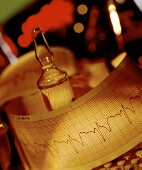- The Best Time of Day to Drink Bone Broth to Maximize Health Benefits
- 8 Ways to Increase Dopamine Naturally
- 7 Best Breads for Maintaining Stable Blood Sugar
- Gelatin vs. Collagen: Which is Best for Skin, Nails, and Joints?
- The Long-Term Effects of Daily Turmeric Supplements on Liver Health
- Could Your Grocery Store Meat Be Causing Recurring UTIs?
- Are You Making This Expensive Thermostat Error This Winter?
- Recognizing the Signs of Hypothyroidism
- 10 Strategies to Overcome Insomnia
- Could Artificial Sweeteners Be Aging the Brain Faster?
More Americans Hospitalized for Irregular Heartbeat, Study Finds


There’s been a sharp rise in the number of Americans hospitalized with a heart rhythm disorder called atrial fibrillation, a new study shows.
Researchers analyzed national data from 2001 to 2010 and found there were nearly 4 million hospitalizations for atrial fibrillation, which is an irregular heartbeat that can lead to stroke and other heart-related complications.
During the study period, the number of hospitalizations for atrial fibrillation increased 23 percent and the costs of treating the condition rose 24 percent. The rise in hospitalizations was especially high among people older than age 65.
More women than men were hospitalized, but the gender difference is narrowing, the investigators found. Hospitals in the South had the highest percentage of atrial fibrillation admissions (38 percent), while those in the West had the lowest (14 percent).
In some good news, in-hospital deaths from atrial fibrillation declined. Death rates were highest among patients with heart failure (8 percent) and those older than 80 (2 percent), according to the study in the May 19 issue of Circulation.
The number of days patients were hospitalized did not change. However, the average inflation-adjusted cost of hospitalization rose from $6,410 to $8,439 per patient, the study showed.
Many patients had co-existing health problems, including high blood pressure (60 percent) and diabetes and lung disease (20 percent), the study authors noted. The percentage of patients who had kidney failure as a co-existing condition was about 12 percent in 2010, a fourfold increase from 2000.
“Atrial fibrillation is a disease in itself, but it also serves as a marker for the severity of other illnesses,” study author Dr. Nileshkumar Patel, an internal medicine physician at Staten Island University Hospital in New York City, said in a journal news release.
He said the rise in hospitalizations for atrial fibrillation is likely due to people living longer and increasing rates of risk factors, such as high blood pressure, obesity, diabetes and sleep apnea.
At least 2.7 million Americans had atrial fibrillation in 2010, according to the American Heart Association.
More information
The U.S. National Heart, Lung, and Blood Institute has more about atrial fibrillation.
Source: HealthDay
Copyright © 2026 HealthDay. All rights reserved.










